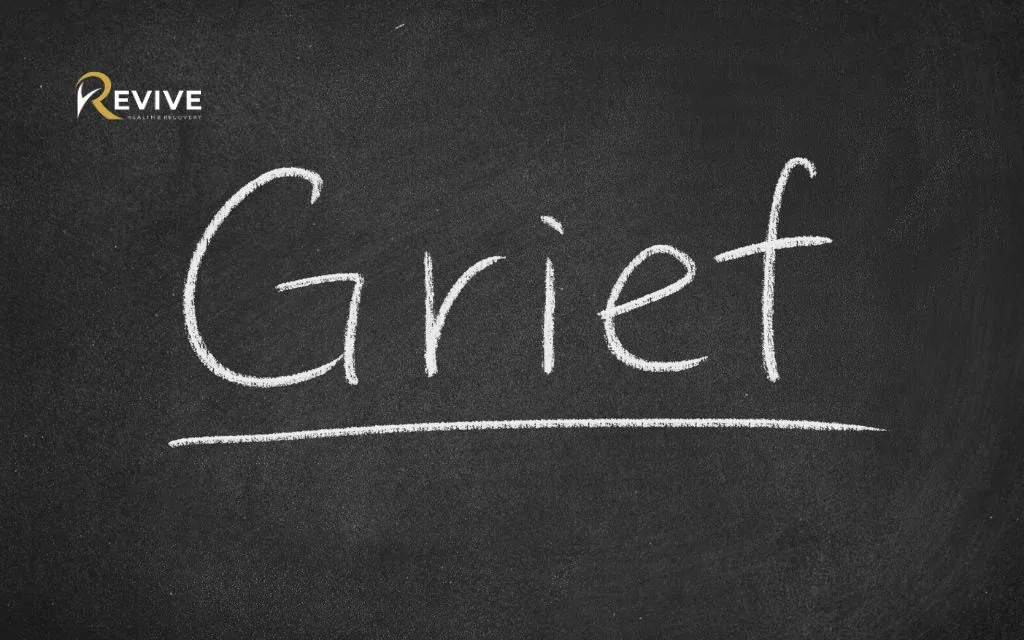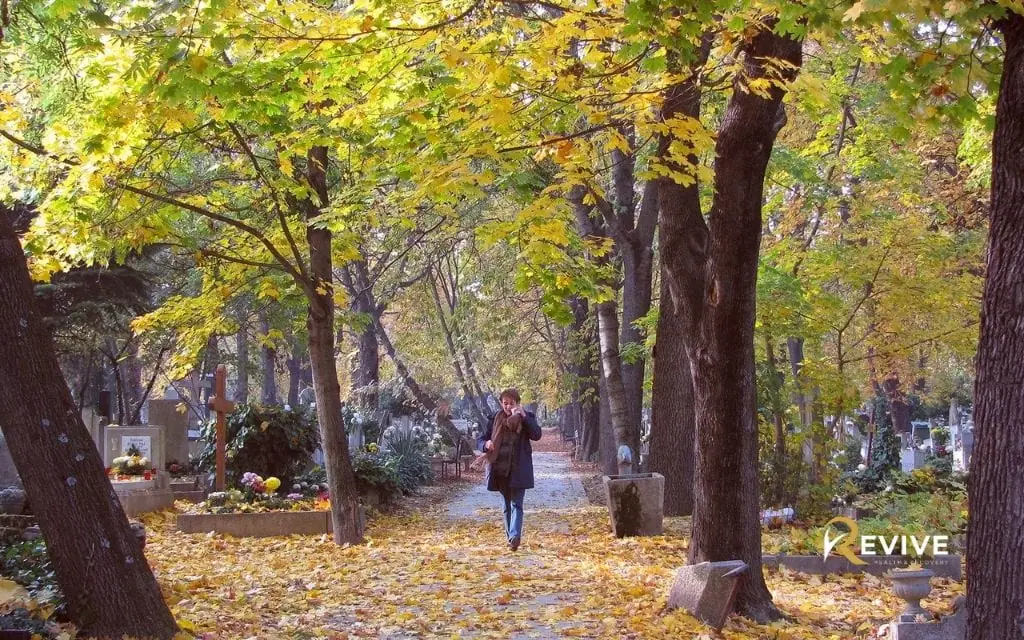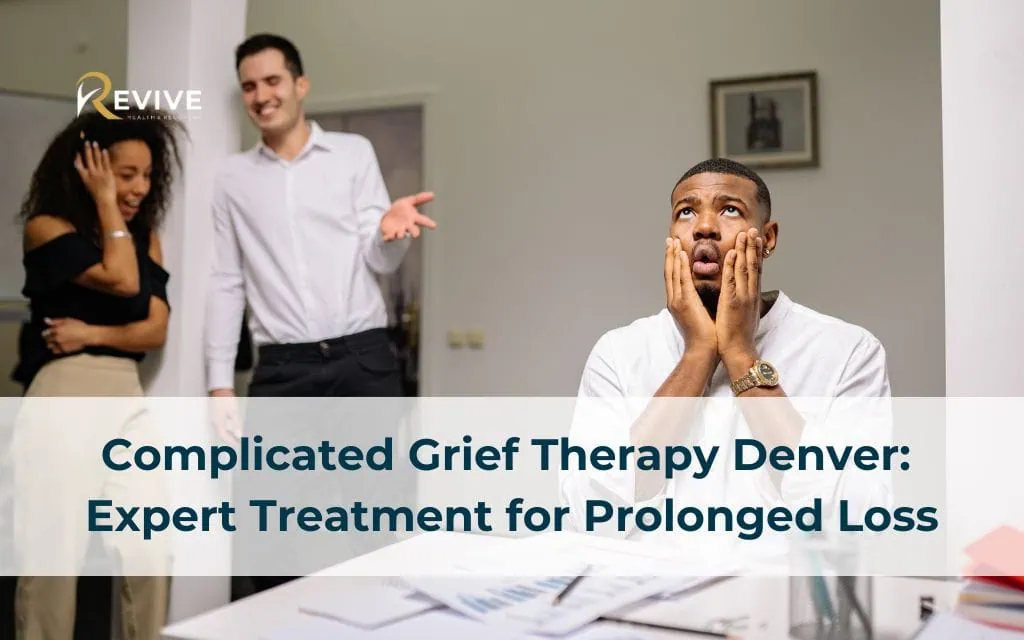When grief feels overwhelming and doesn’t improve months after a loss, you may be experiencing complicated grief disorder. Unlike normal bereavement, complicated grief involves persistent, intense emotional pain that interferes with daily functioning. For those seeking complicated grief therapy Denver services, specialized treatment offers hope for individuals struggling with prolonged mourning.
This evidence-based treatment, rooted in attachment theory, helps individuals process traumatic loss and rebuild meaningful lives. At Revive Health Recovery, our compassionate team understands that grief doesn’t follow a timeline. We provide personalized complicated grief therapy Denver residents trust, using proven therapeutic approaches that address both the emotional impact of loss and the restoration of life purpose.
If you’re in Denver and finding it difficult to move forward after a significant loss, professional grief counseling can help you navigate this challenging journey toward healing and renewed hope. Our experienced grief therapists are ready to support you through this difficult time with evidence-based care tailored to your unique needs.
Understanding Complicated Grief vs Normal Grief
Most people experience grief as a natural response to loss. However, some individuals develop more complex reactions that require specialized intervention. When seeking complicated grief therapy Denver professionals can provide, understanding these differences helps determine when professional grief therapy becomes necessary.
What Is Complicated Grief Disorder?
Complicated grief disorder affects approximately 7-10% of bereaved adults, according to DSM-5-TR criteria. This condition involves persistent, distressing grief symptoms lasting six months or longer beyond cultural norms. Unlike typical bereavement, complicated grief doesn’t naturally diminish over time and often requires complicated grief therapy Denver specialists offer.
The disorder emerges when normal grief processes become disrupted. Attachment theory explains how our deep emotional bonds make certain losses particularly devastating. When these attachments are severed suddenly or traumatically, the mind struggles to process the reality of loss.
Research shows that complicated grief involves distinct neurobiological patterns different from depression or anxiety. This understanding has led to specialized treatment approaches that address the unique aspects of prolonged mourning.
Signs You May Need Professional Grief Support
Several indicators suggest when grief counseling becomes essential:
- Persistent intense yearning and emotional pain dominate your daily experience. You may find yourself constantly searching for your loved one or feeling their presence in ways that feel concerning. This yearning goes beyond normal missing someone and becomes an overwhelming preoccupation.
- Difficulty accepting the reality of loss manifests as persistent disbelief or denial. You might catch yourself planning to call your loved one or setting their place at dinner. These reactions feel automatic and distressing when reality intrudes.
- Avoidance of grief-related triggers becomes extensive and limiting. You might avoid places, people, or activities that remind you of your loss. This avoidance prevents natural healing and keeps you stuck in early grief stages.
- Functional impairment in work, relationships, and daily activities signals the need for professional intervention. When grief prevents you from maintaining responsibilities or connections, specialized grief therapy in Denver can provide the support you need.

Evidence-Based Complicated Grief Therapy Approaches
Professional treatment for complicated grief has evolved significantly in recent decades. Evidence-based approaches now offer hope for those experiencing prolonged mourning. Complicated grief therapy Denver providers utilize these specialized methods to help individuals heal from traumatic loss.
Complicated Grief Therapy (CGT) – The Gold Standard
Complicated Grief Therapy represents the first manualized grief treatment specifically developed for this condition. Clinical trials demonstrate a remarkable 51% effectiveness rate compared to 28% for standard therapy approaches. This significant difference highlights the importance of specialized intervention that complicated grief therapy Denver experts provide.
CGT follows a structured 16-session protocol designed around the dual-process model. This unique approach addresses both loss-oriented and restoration-oriented grief processing. Loss-oriented work involves confronting the reality and pain of loss, while restoration-oriented activities focus on rebuilding life meaning and purpose.
The treatment combines elements from interpersonal therapy and cognitive behavioral therapy within an attachment theory framework. This integration creates a comprehensive approach that addresses multiple aspects of complicated grief simultaneously.
Treatment Components and Techniques
Several specialized techniques distinguish complicated grief therapy Denver programs from standard counseling approaches:
- Imaginal revisiting involves repeatedly telling the story of your loss in a controlled, therapeutic environment. This process helps your mind gradually process traumatic aspects of the death while reducing avoidance behaviors. Your therapist guides you through this work at a pace that feels manageable.
- Situational revisiting protocols help you face avoided places, activities, and memories connected to your loved one. Rather than continuing avoidance, you gradually re-engage with meaningful aspects of your shared life. This process restores access to positive memories while reducing grief-related anxiety.
- Grief monitoring diary work provides a proprietary tool for tracking grief intensity and triggers throughout treatment. This monitoring helps identify patterns and progress while giving you concrete evidence of healing over time.
- Support person involvement brings family members or friends into early treatment phases. This integration helps build a support network while addressing how your grief affects important relationships. Your loved ones learn how to provide meaningful support during your healing journey.

Complicated Grief Treatment Options in Denver
Denver offers various specialized grief support services for those experiencing prolonged mourning. Understanding available options helps you choose the most appropriate care when searching for complicated grief therapy Denver services.
Types of Grief Therapy Available
- Individual complicated grief therapy Denver professionals provide includes personalized, one-on-one treatment tailored to your specific loss experience. This approach allows deep exploration of your unique grief patterns while developing customized coping strategies. Your therapist can adjust techniques based on your progress and needs.
- Group grief counseling and support connects you with others experiencing similar losses. These groups provide valuable peer support while reducing isolation common in complicated grief. Sharing experiences with others who understand your pain creates powerful healing opportunities.
- Family bereavement therapy addresses how loss affects entire family systems. Death impacts all family members, often in different ways and timelines. Family therapy helps restore communication and support while honoring individual grief processes.
- Specialized traumatic grief treatment focuses on losses involving sudden, violent, or unexpected deaths. These circumstances often create additional trauma symptoms requiring integrated treatment approaches. Specialized care addresses both grief and trauma simultaneously.
When to Consider Medication for Grief
While therapy remains the primary treatment for complicated grief, medication sometimes provides valuable support. Antidepressants for complicated grief with depression can help stabilize mood while you engage in therapeutic work. Your healthcare provider can determine if medication might benefit your specific situation.
The best medications for grief-related symptoms typically include antidepressants that address both depression and anxiety components. However, medication alone doesn’t resolve complicated grief – it simply creates conditions that make therapy more effective.
TMS therapy for treatment-resistant grief depression offers an innovative option when traditional treatments prove insufficient. This non-invasive procedure can help reset brain patterns associated with persistent depression following loss. Revive Health Recovery can discuss whether TMS might benefit your treatment plan.
The Healing Process: What to Expect from Grief Therapy
Beginning grief therapy often feels daunting when you’re already struggling with loss. Understanding the process helps reduce anxiety and builds realistic expectations for your healing journey with complicated grief therapy Denver specialists provide.
Initial Assessment and Treatment Planning
Comprehensive grief history evaluation forms the foundation of effective treatment. Your therapist will explore the circumstances of your loss, your relationship with the deceased, and your current symptoms. This assessment helps identify specific factors contributing to complicated grief.
Treatment goals for grief recovery focus on both symptom reduction and life restoration. Rather than simply “getting over” your loss, complicated grief therapy Denver programs aim to help you carry your love forward while rebuilding meaningful engagement with life. Goals include reducing distressing symptoms while developing new sources of purpose and connection.
Creating personalized therapy approaches ensures treatment matches your unique needs and preferences. Some people benefit from structured exercises, while others need more flexible, exploratory approaches. Your therapist adapts techniques based on your learning style and comfort level.
Working Through Loss and Building New Meaning
Processing traumatic aspects of the death involves gradually confronting difficult details you may have avoided. This work happens slowly and safely, with your therapist providing support and guidance throughout. Confronting these realities, while painful, often reduces their power to trigger overwhelming grief responses.
Developing healthy coping skills for grief provides tools for managing difficult emotions and situations. These skills include emotional regulation techniques, communication strategies, and practical approaches for handling grief triggers. You’ll learn to distinguish between healthy grieving and problematic patterns.
Rebuilding life aspirations and relationships represents the restoration-focused aspect of treatment. Complicated grief often involves losing sight of future possibilities beyond your loss. Therapy helps you reconnect with personal values and develop new goals that honor both your loss and your continued living.

Special Considerations for Different Types of Loss
Not all losses create the same grief patterns. Understanding how different circumstances affect mourning helps tailor treatment approaches to your specific situation when seeking complicated grief therapy Denver care.
Sudden vs Anticipated Loss
Traumatic death and complicated bereavement often go together, especially when loss occurs suddenly or violently. These circumstances can create trauma symptoms alongside grief, requiring integrated treatment approaches. Your brain may struggle to process the reality of sudden loss, creating persistent disbelief and searching behaviors.
Prolonged illness and anticipatory grief present different challenges. While you may have time to prepare emotionally, watching a loved one suffer creates its own trauma. Anticipatory grief can be complicated by relief when suffering ends, leading to guilt and confusion about your emotions.
Suicide loss creates unique challenges that require specialized understanding. Complicated grief therapy Denver providers recognize that survivors often struggle with guilt, anger, and unanswered questions that complicate normal grief processes. Treatment addresses these specific concerns while helping you develop healthy ways to remember your loved one.
Supporting Children and Families Through Grief
Childhood bereavement treatment approaches recognize that children process loss differently than adults. Their understanding of death develops gradually, meaning grief reactions may emerge at different developmental stages. Family involvement becomes crucial for supporting children through loss.
Family systems grief therapy addresses how loss disrupts family functioning and communication. Members may grieve differently, creating tension and misunderstanding. Therapy helps families support each other while respecting individual grief styles and timelines.
Group therapy for grieving families provides community support while normalizing diverse grief reactions. Families learn from others who have navigated similar losses while building skills for supporting each other through difficult times.
Denver’s Grief Support Landscape and Resources
Denver offers numerous resources for those experiencing grief and loss. Understanding available options helps you build a comprehensive support network during your healing journey with complicated grief therapy Denver professionals.
Finding the Right Grief Counselor in Denver
Qualifications to look for in grief therapists include specialized training in complicated grief treatment approaches. Look for therapists who understand the difference between normal grief counseling and evidence-based complicated grief therapy Denver specialists provide. Training in CGT or similar approaches indicates specialized expertise.
Questions to ask potential therapists include their experience with complicated grief, their treatment approach, and their understanding of trauma-related grief. Ask about their training and whether they use evidence-based protocols. A qualified grief therapist will welcome these questions and provide clear answers.
Insurance and accessibility considerations affect treatment access for many people. While specific costs vary, Revive Health Recovery works with various insurance plans to make treatment accessible. Contact us at (303) 268-4655 to discuss coverage options and payment plans.
Additional Denver Grief Support Resources
Free grief counseling options in Denver include community mental health centers and religious organizations. While these resources provide valuable support, they may not offer specialized complicated grief treatment. They can serve as important supplements to professional therapy.
Support groups and community resources create additional healing opportunities. Denver hospice organizations, hospitals, and community centers often host grief support groups. These groups provide peer support and reduce isolation common in grief.
Mental health retreats for grief and loss offer intensive healing experiences. These programs combine therapeutic work with supportive community in retreat settings. While not substitute for ongoing therapy, retreats can provide breakthrough experiences and connect you with additional resources.
FAQs About Complicated Grief Therapy Denver
How long does complicated grief therapy typically take?
Complicated grief therapy Denver programs follow a structured 16-session protocol, typically lasting four to six months. However, healing timelines vary based on individual circumstances and treatment progress. Revive Health Recovery provides personalized treatment plans that adapt to your specific needs and pace of healing.
What’s the difference between grief counseling and regular therapy?
Grief counseling specifically addresses loss-related symptoms using evidence-based approaches like CGT. Regular therapy may lack specialized understanding of complicated grief patterns. At Revive Health Recovery, our therapists receive specific training in complicated grief treatment, ensuring you receive the most effective care available.
Will insurance cover complicated grief treatment in Colorado?
Insurance coverage varies by plan and provider. Many insurance plans cover mental health treatment, including specialized grief therapy. Contact Revive Health Recovery at (303) 268-4655 to verify your coverage and discuss payment options for complicated grief therapy Denver services.
How do I know if my grief is “normal” or if I need professional help?
Normal grief typically improves gradually over time, while complicated grief persists and interferes with daily functioning beyond six months. If you’re experiencing persistent yearning, avoidance, or functional impairment, professional evaluation can help determine appropriate treatment. Revive Health Recovery provides comprehensive assessments to identify complicated grief.
Can grief therapy help with other symptoms like anxiety and depression?
Yes, complicated grief therapy addresses the full range of symptoms associated with prolonged mourning, including anxiety and depression. The integrated approach used at Revive Health Recovery treats grief alongside related mental health concerns, providing comprehensive care for your healing journey.
Why Choose Revive Health Recovery for Grief Therapy in Denver
Revive Health Recovery stands as Denver’s premier provider of specialized complicated grief therapy Denver residents trust, offering comprehensive care that goes beyond traditional grief counseling.
Specialized Expertise: Our team includes certified grief therapists trained in evidence-based complicated grief therapy protocols. We understand the distinct differences between normal bereavement and complicated grief, ensuring you receive appropriate specialized care rather than standard counseling approaches.
Comprehensive Approach: We address both emotional healing and practical life restoration in our treatment plans. Our dual-process model helps you process your loss while rebuilding meaningful engagement with life, honoring both your grief and your continued living.
Personalized Care: Each client receives individualized treatment tailored to their specific loss and grief experience. We recognize that no two grief journeys are identical, adapting our evidence-based approaches to match your unique needs and circumstances.
Accessible Location: Conveniently located at 1427 S Federal Blvd, Denver, with flexible scheduling options that accommodate your needs. We understand that complicated grief can make daily tasks challenging, so we work with you to create manageable treatment schedules.
Holistic Support: Beyond individual therapy, we offer family support and connect clients with community resources. Our comprehensive approach recognizes that grief affects entire support systems, providing care that strengthens your overall healing environment.
Begin Your Healing Journey Today
Healing from complicated grief is possible with the right professional support. At Revive Health Recovery, we understand that every grief journey is unique, and we’re committed to walking alongside you as you navigate this difficult path toward hope and renewal.
Our experienced complicated grief therapy Denver team is ready to help you process your loss, develop healthy coping strategies, and rebuild a meaningful life. Don’t let complicated grief keep you stuck in pain – take the first step toward healing today.
You don’t have to face this journey alone. Our compassionate team provides the specialized care you need to move forward while honoring your loved one’s memory. Contact us today to begin your path toward healing and hope.
Contact Revive Health Recovery:
- Address: 1427 S Federal Blvd, Denver, CO 80219
- Phone: (303) 268-4655 (Available 24/7)
- Email: contact@revivehealthrecovery.com
Ready to begin your healing journey? Call us today to schedule your initial grief therapy consultation. You deserve support, understanding, and hope as you navigate this difficult time.



